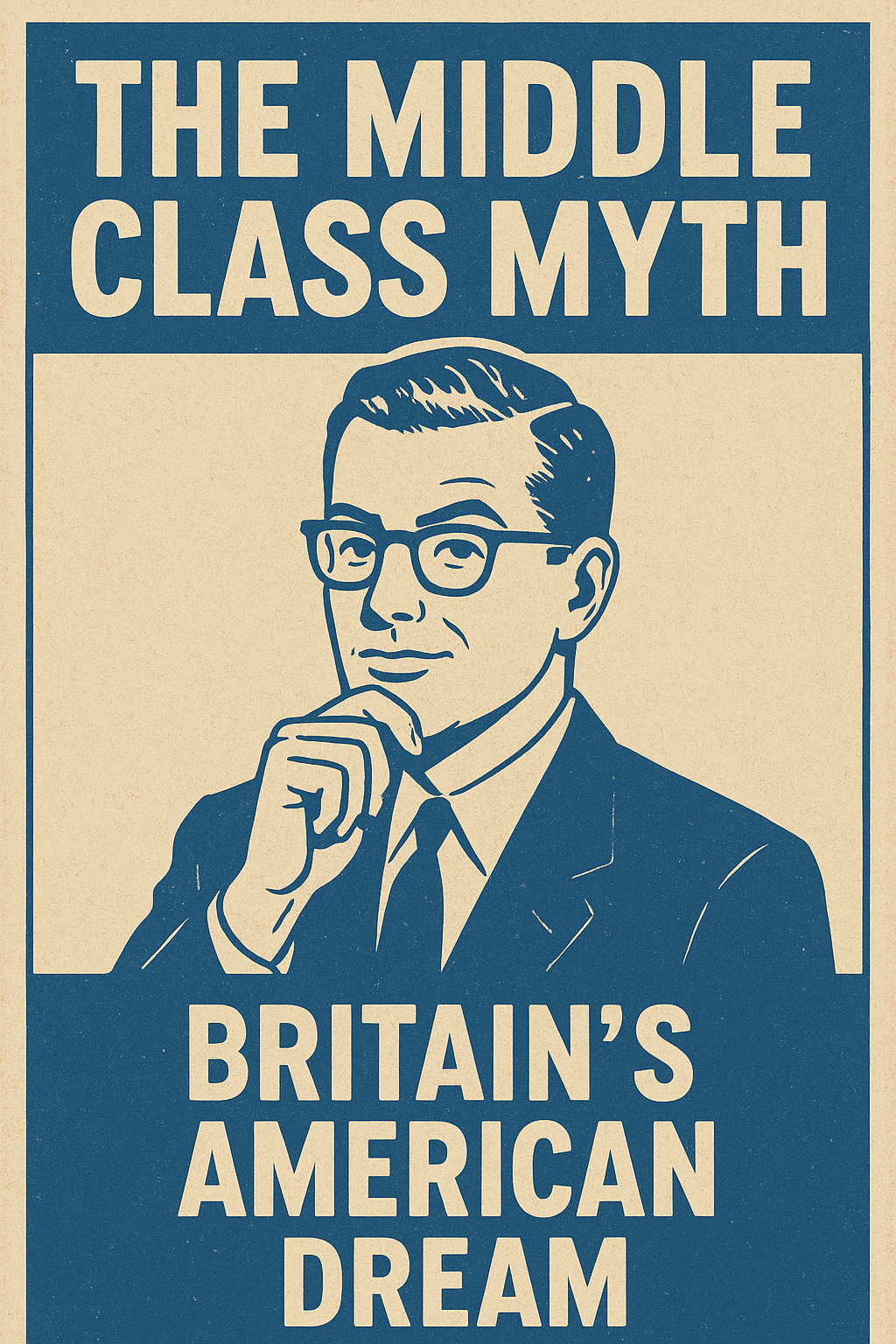I often avoid the term “class”: its historic baggage can obscure the material realities facing people in Britain today. But the debate matters – how we define “middle class” shapes economic expectations, political debates, and people’s sense of security.
The Middle Class Myth: Britain’s American Dream
Once, “middle class” in Britain meant stable income, a respectable home, white-collar work, and the promise of social mobility. Today, that ideal is largely a hollow identity, unmoored from material reality.
1. The Vanishing Middle
What does it really mean to be middle class in 2025? For decades, the label implied economic security. Now, it’s widely worn as an identity badge. Many so-called middle-class families live pay-cheque to pay-cheque, rent their homes, juggle insecure work, and are burdened with debt. In fact, one in three self-identified middle-class adults report struggling to cover basic expenses each month1See ONS 2024 “Living Standards in the UK.”.
2. Britain’s Subtle American Dream
Britain has long borrowed from the American Dream – meritocracy, ‘bootstraps’, hard work – but filtered it through a British lens: work hard, go to university, buy a semi-detached house, achieve a white-collar job, maybe take a couple of holidays a year. Yet for most, the old promise is fading. Is the British version of the American Dream still possible – or ever was?
3. Capitalism and the Myth of Meritocracy
Capitalism pushes the belief that anyone can rise on merit. It’s a seductive narrative: pull yourself up, and success follows. But structural inequalities make such mobility rare for the majority2The myth of meritocracy narrative has been shown to reproduce class hierarchy despite expanded education..
The apparent gains of the aspiring classes were often built on privatisations and policies that left future generations with less3See The Hidden Cost of Public-Private Partnerships for how state assets became private profits.
4. The Aesthetic of Respectability
As some climbed into “middle class” status, attitudes shifted: moral superiority, snobbery, and detachment from working-class backgrounds. Lifestyle consumption, tabloid fantasies about “benefit scroungers”, and identity-based separation became the norm. This process did not happen by accident – it has been used politically, turning culture wars and populist rhetoric into distractions from economic stagnation4See Divide, Distract, And Dominate for how scapegoating and social resentment are being weaponised.
5. The Collapse of Substance beneath the Identity
Many now nominally middle-class people face gig economy insecurity, stagnant real wages, unaffordable rents, and little to no pension security. In some respects, they are worse off than previous generations of working-class families. For example, home ownership among under-40s has fallen from nearly 65% in 1990 to just 35% today5ONS, UK Household Home-ownership Data, 2024..
The middle class, as a material reality, is collapsing. The identity persists – but it no longer protects from the harsh effects of economic policy. “Middle-class” precarity now includes the risk of needing benefits, even as support is being cut6See this analysis of benefit cuts and this piece on Personal Independence Payment (PIP) and council tax chaos.
“My parents bought their home on one salary. Now, I earn more than they ever did, yet half my income disappears on rent every month,” says a Cambridge graduate in her 30s. The reality for millions is a life on the edge, no matter how ‘middle-class’ their job title sounds.
6. Social Mobility: The Illusion Persists
Intergenerational mobility remains stubbornly low: just 34% of children from the poorest UK families reach the top half of the income distribution as adults7Institute for Fiscal Studies, “Intergenerational Income Mobility in the UK”.. Family background continues to shape life chances, and expanded education has not fully levelled the playing field8Studies show education has failed to fully equalise opportunity because structural advantages persist.
Disillusioned former middle-class voters are turning to populist messages, which promise to restore “power to ordinary people,” yet in practice reinforce elite control9See Reform UK’s Populist Surge for how political anger is being redirected.
7. Class without Substance
Today, “middle class” is mainly a cultural performance, not a guarantee of privilege. The real divide is between those who own assets – housing, capital, business – and those forced to sell their labour, regardless of profession.
Even as traditional boundaries blur, modern technology reinforces inequality in new ways – algorithmically sorting people by postcode, purchases, and credit history10See From Likes to Lies and Smart Data, Unfair Outcomes.
The so-called middle class never truly held power – only proximity to it. As social consensus fractures, the label remains, but it defines little11See this Marxian critique of elite power and The Quiet War.
Material class realities are now all about ownership, not occupation or manners. Those without assets, no matter how professional, live at the mercy of rising rent, shrinking services, and automated decision-making12See The Land of the Few and Why UK Councils Aren’t Building Homes.
If class is less about identity and more about ownership, what future is left for those trapped in economic limbo?
Explore more from The Apoplectic Politico:
- Divide, Distract, And Dominate – on political distraction and culture wars
- Your Money, Their Rules – on financial control and state surveillance
- Psychohistory and the Rise of Predictive AI – on control through forecasting
- 1See ONS 2024 “Living Standards in the UK.”
- 2The myth of meritocracy narrative has been shown to reproduce class hierarchy despite expanded education.
- 3See The Hidden Cost of Public-Private Partnerships for how state assets became private profits
- 4See Divide, Distract, And Dominate for how scapegoating and social resentment are being weaponised
- 5ONS, UK Household Home-ownership Data, 2024.
- 6
- 7Institute for Fiscal Studies, “Intergenerational Income Mobility in the UK”.
- 8Studies show education has failed to fully equalise opportunity because structural advantages persist
- 9See Reform UK’s Populist Surge for how political anger is being redirected
- 10
- 11
- 12


‘Material class realities are now all about ownership, not occupation or manners.’
To those of a Marxian perspective this was always the case – it was only with the rise of ‘sociology’ and various liberal economists that made the myth of a ‘middle-class’ which elevated the rather more prosperous members of the working class to a separate economic ‘class’. Of course this was part of the usual ‘divide and conquer’ propaganda of the parasite class to destroy class consciousness within the vast majority who were, and are, totally dependent on wages and salaries to live an adequate life. Ownership of sufficient capital to sustain your life rather than having to work for a parasite is the only class division worthy of consideration.
Thank you for your thoughtful comment. I appreciate the Marxian critique that places ownership, rather than occupation or culture, at the heart of class structure. It’s certainly true that asset ownership, more than job titles or manners, now determines real security for most people in Britain today. As noted in the article, social mobility remains limited and inequalities persist, even amongst those who might self-identify as “middle class.”
However, I would add that the aspirational aspect of the “middle class myth” is not wholly negative. While it’s true that narratives of meritocracy and individual striving can sometimes obscure deep-rooted inequalities and may even be used to justify structural exploitation, aspiration itself is not intrinsically linked to exploitation for profit. Aspiration, the drive to improve one’s circumstances, learn, and contribute meaningfully, can have value and dignity independent of capitalist profit motives. Many find personal fulfilment in education, creative work, or community engagement, regardless of whether these activities lead to accumulation of wealth or power.
I think it’s important not to throw out the positive emotional and psychological aspects of aspiration just because the broader economic system is flawed. Aspiring to improve oneself or one’s situation can be its own reward and a source of resilience and hope, not just a tool of systemic manipulation.
Where I agree is that without real opportunities (such as secure housing, decent wages, or accessible education), aspiration can become cruelly frustrating. For aspiration to be meaningful, it must be accompanied by genuine possibilities for advancement, not just the empty promise of mobility.
In short: While I agree that focusing only on cultural or occupational markers of “middle class status” misses the material reality, I also believe aspiration shouldn’t be dismissed simply because it’s sometimes co-opted by those in power. Ultimately, the value of aspiration should be judged by who benefits from it, and whether it leads to a fairer, more just society.
Thank you for engaging in the discussion!